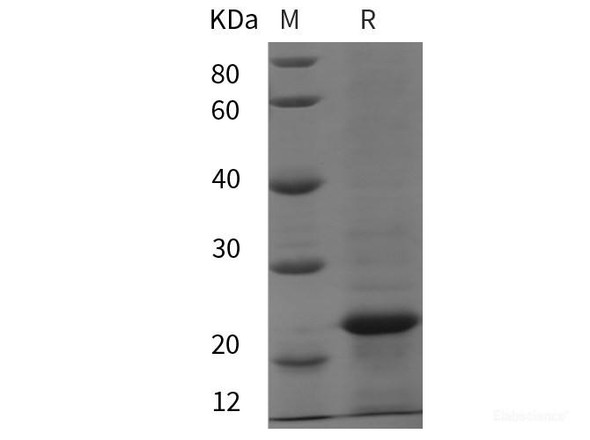Rat MMP-2/CLG4A Recombinant Protein (His tag)
- SKU:
- RPES5891
- Product Type:
- Recombinant Protein
- Species:
- Rat
Frequently bought together:
Description
| Product Name: | Rat MMP-2/CLG4A Recombinant Protein (His tag) |
| Product Code: | RPES5891 |
| Size: | 20µg |
| Species: | Rat |
| Expression Host: | E.coli |
| Synonyms: | 72 kDa Type IV Collagenase, 72 kDa Gelatinase, Gelatinase A, Matrix Metalloproteinase-2, MMP-2, TBE-1, MMP2, CLG4A, CLG4, MMP-II, MONA, TBE-1 |
| Mol Mass: | 29.37 kDa |
| AP Mol Mass: | 35 kDa |
| Tag: | N-His |
| Purity: | > 95 % as determined by reducing SDS-PAGE. |
| Endotoxin Level: | Please contact us for more information. |
| Bio Activity: | Testing in progress |
| Sequence: | Tyr 395-Cys 662 |
| Accession: | P33436 |
| Storage: | Generally, lyophilized proteins are stable for up to 12 months when stored at -20 to -80°C. Reconstituted protein solution can be stored at 4-8°C for 2-7 days. Aliquots of reconstituted samples are stable at < -20°C for 3 months. |
| Shipping: | This product is provided as lyophilized powder which is shipped with ice packs. |
| Formulation: | Lyophilized from sterile PBS, pH 7.4. Normally 5 % - 8 % trehalose, mannitol and 0.01% Tween80 are added as protectants before lyophilization. Please refer to the specific buffer information in the printed manual. |
| Reconstitution: | Please refer to the printed manual for detailed information. |
| Background: | Matrix Metalloproteinase-2 (MMP-2) is an enzyme that degrades components of the extracellular matrix and thus plays a pivotal role in cell migration during physiological and pathological processes. MMP-2 expression is dependent on extracellular matrix metalloproteinase inducer (EMMPRIN); Her2/neu; growth factors; cytokines; and hormones. Pro-MMP-2 activation needs MT1-MMP and TIMP-2 contribution. MMP-2 is changed in distribution and increased in amount in the ventral cochlear nucleus after unilateral cochlear ablation. A low level of MMP-2 is linked to favorable prognosis in patients with a hormone receptor-negative tumor; usually associated with high risk. As a zymogen requiring proteolytic activation for catalytic activity; MMP-2 has been implicated broadly in the invasion and metastasis of many cancer model systems; including human breast cancer (HBC). Blocking MMP-2 secretion and activation during breast carcinoma development may decrease metastasis. The detection of active MMP-2 alone or the rate of pro-MMP-2 and active MMP-2 is considered a very sensitive indicator of cancer metastasis. Modulation of MMP-2 expression and activation through specific inhibitors and activators may thus provide a new mechanism for breast cancer treatment. |










